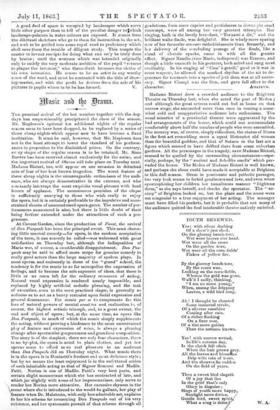Madame Ristori drew a crowded audience to the Brighton Theatre
on Thursday last, when she acted the part of Medea ; and although the great actress could not feel at home on that narrow stage, she succeeded more than once in rousing a some- what cold and unappreciative audience into enthusiasm. The usual miseries of a provincial theatre were aggravated by the bad arrangements of the house, which could not accommodate comfortably above half the number of people who were assembled. The scenery was, of course, simply ridiculous, the statue of Diana in the first act resembling more a squat Hottentot old woman than the beautiful goddess, and that of Saturn in the last act a figure which seemed to have drifted there from some suburban gardens. All the personages in the tragedy, save Madame Ristori, seemed to be quelled by the surrounding circumstances—espe- cially, perhaps, by the "ancient and fish-like smells" which per- vaded the house. The Medea of Madame Ristori is well known, and perhaps she alone could have made it acceptable at Brighton in this dull season. Great in passionate and pathetic passages, her very look seems to forbid gentleness and love, and even when apostrophizing her children her tumultuous manner "frightens them," as she says herself, and shocks the spectator. The "so- ciety" of Brighton looked on, but the place and the scene were not congenial to a true enjoyment of her acting. The manager must have filled his pockets, but it is probable that not many of the audience quitted the foul intolerable theatre entirely satisfied.



































 Previous page
Previous page